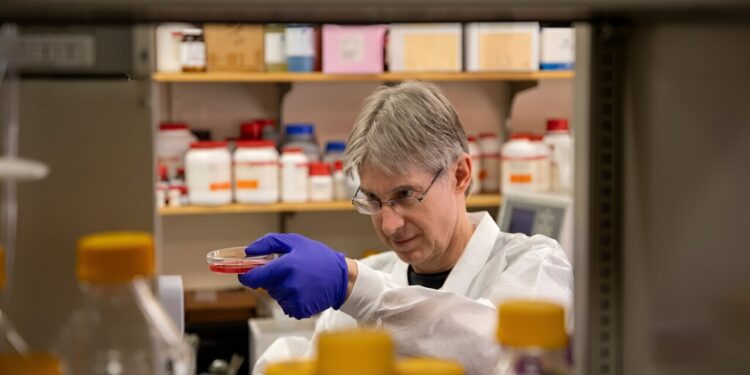Michael Klemba studies a petri dish in his laboratory. Credit: Max Esterhuizen for Virginia Tech
Living organisms often create from scratch what is necessary for life. For humans, this process means the creation of the most essential compounds necessary for survival. But not all living things have this ability, such as the parasite responsible for malaria, which has affected around 249 million people in 2022.
Virginia Tech researchers in the College of Agriculture and Life Sciences found that by preventing the malaria parasite from scavenging fatty acids, a necessary type of nutrient, it could no longer grow. Their work is published in the journal Proceedings of the National Academy of Sciences.
“The key to this breakthrough is that we were able to develop a method to screen for the malaria parasite and block this process,” said Michael Klemba, associate professor of biochemistry and principal investigator of the project. “Although it is still early days, the results could open the door to a new way to fight malaria.”
Malaria occurs when the parasite replicates in human red blood cells and relies on scavenging rather than creation to meet its fatty acid needs. Many fatty acids are obtained by metabolizing a class of host lipids, called lysophospholipids. However, scientists did not know how the parasite releases fatty acids from the host’s lipids.
The Virginia Tech research team conducted experiments with infected red blood cells and discovered chemicals that can prevent the parasite from obtaining necessary fatty acids. The researchers discovered that two enzymes were instrumental in breaking down the host’s lipids to release the fatty acids the parasite needs. These enzymes act in different places: one acts outside, in the red blood cell, and the other, inside the parasite.
When scientists removed these two enzymes, they discovered that the parasite had difficulty obtaining necessary fatty acids and could not grow properly. This was especially true when this host lipid was the only fatty acid source available. When both enzymes were stopped from working, either by changing the parasite’s genes or by using drugs, the parasites were no longer able to grow in human blood.
This shows that breaking down the host lipid, called lysophosphatidylcholine, to obtain fatty acids is essential for the survival of the malaria parasite in our bodies and that targeting these two enzymes could provide a new way to fight malaria.
Lay the foundation
In 2017, a study showed that when levels of lysophosphatidic acid drop in the host, the malaria parasite, known as Plasmodium falciparum, changes to a form that can be absorbed by mosquitoes. P. falciparum causes malaria by replicating in the host’s erythrocytes, or red blood cells, and relies on scavenging rather than synthesis, or creating compounds, to meet its fatty acid needs.
This appears to be an important environmental signal, Klemba said, and there is also evidence that host lipids are a preferred source of fatty acids.
“There was no clarity on the metabolic pathways,” he said. “If we could show that these metabolic pathways were useful, that would be an important contribution to the field.”
For Klemba, this was an important question to answer and one that his lab – and his students – were in a unique position to do. Two graduate students worked on the project: Jiapeng Liu, now a postdoctoral researcher at Rutgers University, and Christie Dapper, a former professor at Virginia Tech. Liu was the lead author and Katherine Fike contributed to the project as a research specialist.
“There are two enzymes that are really important for this process: One is inside the parasite and the other is exported into the host cell,” Klemba said, “which is not typical of metabolic processes because they are generally carried out within the parasite. “Why did the parasite find it useful to introduce one of these enzymes into the host? We have some ideas that it might be involved in modifying the host, which could be that the parasite is remodeling the red blood cell once installed.”
The researchers found that simply deleting one of two enzymes, which they named XL2 and XLH4, did nothing. Both must be removed to inhibit parasitic growth.
Future work
The discovery has some limitations: the research was carried out only using a culture dish, commonly called in vitro. Researchers also don’t know whether the compounds used to inhibit the two enzymes are toxic.
A certain level of toxicity is expected, Klemba explained, and it might be possible to modify the toxicity of the compounds.
“But this could pose a major challenge,” he said.
In the meantime, this discovery could open the door to therapeutic treatments against malaria.
More information:
Jiapeng Liu et al, Host lysophosphatidylcholine metabolism in erythrocytes infected with Plasmodium falciparum, Proceedings of the National Academy of Sciences (2024). DOI: 10.1073/pnas.2320262121
Provided by Virginia Tech
Quote: Researchers find that blocking an essential nutrient inhibits the growth of malaria parasites (February 13, 2024) retrieved February 14, 2024 from
This document is subject to copyright. Apart from fair use for private study or research purposes, no part may be reproduced without written permission. The content is provided for information only.



